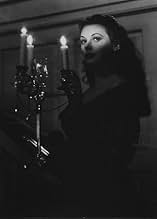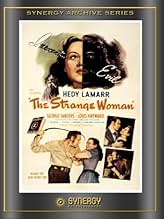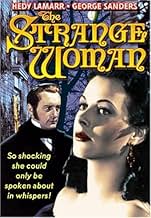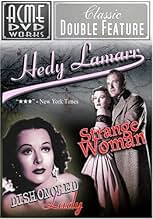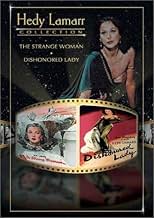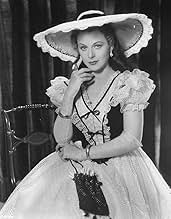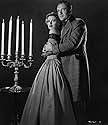IMDb RATING
6.5/10
2.7K
YOUR RATING
In 1820s New England beautiful but poor and manipulative Jenny Hager marries rich old man Isaiah Poster but also seduces his son and his company foreman.In 1820s New England beautiful but poor and manipulative Jenny Hager marries rich old man Isaiah Poster but also seduces his son and his company foreman.In 1820s New England beautiful but poor and manipulative Jenny Hager marries rich old man Isaiah Poster but also seduces his son and his company foreman.
Ed Agresti
- Congregation Member
- (uncredited)
John Alban
- Congregation Member
- (uncredited)
Fred Aldrich
- Sailor in Saloon
- (uncredited)
Jessie Arnold
- Mrs. Thatcher
- (uncredited)
Frank Baker
- Congregation Member
- (uncredited)
Edward Biby
- Mr. Partridge
- (uncredited)
Featured reviews
An 1820's vixen climbs her way maliciously up the social ladder.
The movie's got the gloss and the casting of a top studio production, maybe TCF. But it's not. Instead, the film is an independent production with Lamarr as a co-producer. I mention this because the result looks tailor-made for a Lamarr career move; at the same time, she does manage to prove she's more than just Hollywood's perfect face. Here, her conniving little vixen (Jenny) transits a number of emotional stages and male victims in fairly convincing style. However, unless I missed something, Jenny's inner guile fails to show up in any of the many close-ups. As a result, Jenny's deceit remains mainly in the script—the one performance flaw.
The movie itself is an atmospheric potboiler, thanks to stylist Edgar Ulmer and art director Remisoff. The scenes may remain stage-bound, but the overall effect is compelling, a triumph of b&w expressiveness. Note too how the scenes get steadily darker as the film progresses and Jenny gets closer to the expected reckoning. Even when the screenplay meanders, which does slow things down, the visuals remain smoothly engaging. Then too, the logging camp setting should have been rethought. The sophisticated Sanders is simply not an outdoor type. Still, wonder of wonders, two of cinema's favorite cerebral baddies, Sanders and Brooke, get sympathetic roles, for a change. Actually, I expected Sanders to break into a cynical sneer at any moment, and maybe Brooke to revert to type with an icy glare. Anyway, it is an interesting cast, down to Hayward as the weakling Ephraim and little Jo Ann Marlowe as the meanest girl since Patty McCormack's Bad Seed (1956).
I don't know if the film resulted in the kind of career break Lamarr was likely looking for, but it remains an entertaining morality tale, despite a spotty script and stage-bound settings.
The movie's got the gloss and the casting of a top studio production, maybe TCF. But it's not. Instead, the film is an independent production with Lamarr as a co-producer. I mention this because the result looks tailor-made for a Lamarr career move; at the same time, she does manage to prove she's more than just Hollywood's perfect face. Here, her conniving little vixen (Jenny) transits a number of emotional stages and male victims in fairly convincing style. However, unless I missed something, Jenny's inner guile fails to show up in any of the many close-ups. As a result, Jenny's deceit remains mainly in the script—the one performance flaw.
The movie itself is an atmospheric potboiler, thanks to stylist Edgar Ulmer and art director Remisoff. The scenes may remain stage-bound, but the overall effect is compelling, a triumph of b&w expressiveness. Note too how the scenes get steadily darker as the film progresses and Jenny gets closer to the expected reckoning. Even when the screenplay meanders, which does slow things down, the visuals remain smoothly engaging. Then too, the logging camp setting should have been rethought. The sophisticated Sanders is simply not an outdoor type. Still, wonder of wonders, two of cinema's favorite cerebral baddies, Sanders and Brooke, get sympathetic roles, for a change. Actually, I expected Sanders to break into a cynical sneer at any moment, and maybe Brooke to revert to type with an icy glare. Anyway, it is an interesting cast, down to Hayward as the weakling Ephraim and little Jo Ann Marlowe as the meanest girl since Patty McCormack's Bad Seed (1956).
I don't know if the film resulted in the kind of career break Lamarr was likely looking for, but it remains an entertaining morality tale, despite a spotty script and stage-bound settings.
Made just after Hedy had departed MGM when she was still a top star and able to pursue roles with more depth than the glamour assignments handed her by Metro. She was one of the producers of this outing and selected Ulmer as director. Theirs was a contentious partnership but the result was one of Hedy's best performances.
If you can put aside the fact that the lead character has a Viennese accent and her father an Irish one when they are both lifelong natives of Bangor, Maine then there is much to enjoy. Hedy, stunningly beautiful as always, plays a deeply conflicted woman well and though the film veers wildly from morality tale to lurid melodrama it is certainly more fun than a lot of more highly thought of films.
If you can put aside the fact that the lead character has a Viennese accent and her father an Irish one when they are both lifelong natives of Bangor, Maine then there is much to enjoy. Hedy, stunningly beautiful as always, plays a deeply conflicted woman well and though the film veers wildly from morality tale to lurid melodrama it is certainly more fun than a lot of more highly thought of films.
Hedy Lamarr and Egar G. Ulmer. OK. It really did happen, improbable as the pairing seems.
She is very convincing as the daughter of a drunk who wants to dominate men and the society that squashed her when she was a child. It seems to me that her father speaks with a Scottish burr and that she does very briefly. The story might better have been changed so that he was an immigrant whose accent would be more consistent with th4e luscious Ms. Lamarr's own.
Nevertheless, it is atmospheric and very troubling. She marries an older man and immediately starts out in pursuit of his son. She gets the son and throws him over (a bit improbably) for Gweorge Sanders, wearing mutton chop sideburns here.
It's not Ulmer'best -- that might be his "Hamlet"pdate "Strange Illusion." But it is very good and it is one of the best performances ever given by Ms. Lamarr.
She is very convincing as the daughter of a drunk who wants to dominate men and the society that squashed her when she was a child. It seems to me that her father speaks with a Scottish burr and that she does very briefly. The story might better have been changed so that he was an immigrant whose accent would be more consistent with th4e luscious Ms. Lamarr's own.
Nevertheless, it is atmospheric and very troubling. She marries an older man and immediately starts out in pursuit of his son. She gets the son and throws him over (a bit improbably) for Gweorge Sanders, wearing mutton chop sideburns here.
It's not Ulmer'best -- that might be his "Hamlet"pdate "Strange Illusion." But it is very good and it is one of the best performances ever given by Ms. Lamarr.
What a story and well acted. Hedy as a teenager and then into a grown woman. She was fantastic looking and fantastic in it. I thought George Sanders, whom I admired as an actor was miscast though. Louis Hayward was excellent as the weak son. In fact everyone in it was well cast. Too bad it wasn't in color, or done by a major studio. I could of sworn the little girl that portrays Hedy as a child was also fantastic for her age. She even looked like Hedy may of looked like at that age. Definitely worth watching.
Propelled by powerful performances, a good script and strong cinematography, The Strange Woman explores the life of a beautiful, headstrong, passive aggressive femme fatale in Bangor, Maine, during the early 19th century. Hedy Lamar leads an excellent cast and gives it everything she has. Jenny Hager is a deeply troubled woman who grew up in a dysfunctional relationship with an alcoholic father, and married into a rich family. Throughout her life before and after this marriage, she quietly and subtly plotted and schemed to get where, what and who she wanted, while keeping up the appearance of a good, honest country lady.
The film focuses almost exclusively on Jenny and her romantic entanglements, but is also satisfying as a rather odd example of an anachronistic film noir. As such, it is very original in both concept and story. The Strange Woman may be the best piece of directing accomplished by the very prolific B film-maker Edgar Ulmer (Detour). It is nicely shot and paced, and, unlike many noir films, contains a few positive messages in addition to the disturbing stuff.
Recommendation: Serious noir fans will appreciate this, but you have to give this film some time to breathe. It is fairly slow and contains only a few action scenes - which are not its highlights by any stretch. It is also very focused on gender stereotypes (not all of which are treated uncritically), so its appreciation takes a little more thought than the genre standard.
The film focuses almost exclusively on Jenny and her romantic entanglements, but is also satisfying as a rather odd example of an anachronistic film noir. As such, it is very original in both concept and story. The Strange Woman may be the best piece of directing accomplished by the very prolific B film-maker Edgar Ulmer (Detour). It is nicely shot and paced, and, unlike many noir films, contains a few positive messages in addition to the disturbing stuff.
Recommendation: Serious noir fans will appreciate this, but you have to give this film some time to breathe. It is fairly slow and contains only a few action scenes - which are not its highlights by any stretch. It is also very focused on gender stereotypes (not all of which are treated uncritically), so its appreciation takes a little more thought than the genre standard.
Did you know
- TriviaExecutive producer Hunt Stromberg declared his dissatisfaction with the original opening sequence of Edgar G. Ulmer's own daughter Arianne Ulmer who played the young Jenny - she was purportedly not nasty enough - and so he and Hedy Lamarr enlisted Douglas Sirk to re-shoot the scenes using Jo Ann Marlowe who had appeared in Sirk's own Scandale à Paris (1946) earlier that year, and who had also featured as Joan Crawford's daughter Kay in Michael Curtiz' Le roman de Mildred Pierce (1945).
- GoofsEphraim paints "Nöel" rather than the correct "Noël."
- Quotes
Lena Tempest: Honey, listen, with your looks you don't have to worry. You can get the youngest and best-looking man on the pier.
Jenny Hager: I don't want the youngest. I want the richest.
- Alternate versionsLe démon de la chair (1946). Restoration Produced by Jeff Joseph/SabuCat. Digital scan by Film & Video Transfer, Chatsworth, CA. Cineaste Restoration - Thad Komorowski.. Final Conforming & Cleanup by The Finishing Touch. The Strange Woman (Restored Version) copyright 2020 Jeff Joseph/SabuCat.
- ConnectionsFeatured in Edgar G. Ulmer: The Man Off-Screen (2004)
- SoundtracksWhat Can You Do with a Drunken Sailor?
Traditional
Early 19th Century sea chanty
[Heard in tavern]
- How long is The Strange Woman?Powered by Alexa
Details
- Release date
- Country of origin
- Official sites
- Language
- Also known as
- Flor de insidia
- Filming locations
- Production companies
- See more company credits at IMDbPro
- Runtime1 hour 40 minutes
- Color
- Aspect ratio
- 1.37 : 1
Contribute to this page
Suggest an edit or add missing content


